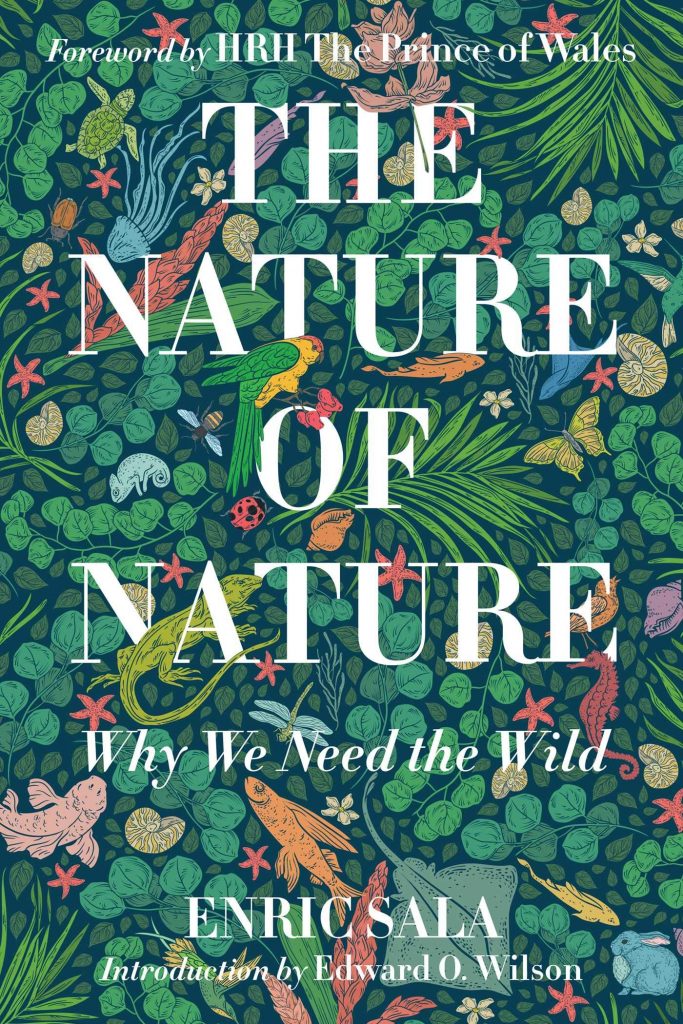Sustainability Book Review: The Nature of Nature
91´«Ã½
As a reoccurring feature on the Sustainability Roundtable blog, we will post reviews of books related to sustainability. Interested in submitting your own review to the blog? Contact August at aolundsmith@gmail.com.

by Enric Sala, National Geographic, 2020.
Reviewed by Rachel Sperling
Chapter Twelve of The Nature of Nature: Why We Need the Wild is called "The Moral Imperative," and in it, author Enric Sala describes how he and his team of researchers and conservation advocates communicate with world leaders and policy makers, to convince them that the natural environment - "the wild," as Sala puts it - is worth saving. He does so not by barraging his audience with charts and graphs full of complicated data - not at first, anyway - but by showing them just what they stand to lose if serious efforts to stem biodiversity and habitat loss are not taken. In this chapter, Sala describes taking President Ali Bongo Ondimba of Gabon out on his expedition vessel in 2002, and allowing him to pilot the vessel's remotely operated vehicle, "a submersible robot tethered to the ship and armed with a camera that allows one to watch the underwater world in real time". Sala goes on to describe President Bongo Ondimba's reactions, including his sudden connection with the world below the waves, and his growing understanding that these waters off Gabon's coast need to be protected.
Though it occurs late in the book, the moment stands out because it's a good illustration of a couple of Sala's overarching themes: humans are part of the global ecosystem, and if we better understood our place and the effects of our actions, we might change our policies and behaviors. Sala's writing is accessible to scientists and non-scientists alike; using plain language and clear, relatable examples, he explains how ecosystems function, how small changes - such as the removal of one species - can have devastating consequences, and why biodiversity is a good thing for everyone. The final chapter - added just prior to publication - deals with COVID-19, which is fitting because zoonotic viruses like COVID-19, H1N1, and SARS, are a result of human exploitation of nature.
One aspect I do wish that he had touched upon is the future of those people whose livelihoods would be impacted by more sustainable practices. While the moral imperative - to use Sala's phrase - is clear, it's an important issue and one that needs to be addressed. That said, in this slim volume, Sala makes his argument effectively and I recommend this book strongly to anyone who is interested in clear, concise science writing, particularly on the subjects of biodiversity, and human impact on the global ecosystem.
Enric Salas received his B.Sc. from the University of Barcelona in 1991, and his Ph.D. from the University of Aix-Marseille II in 1996. A former university professor, he is currently a National Geographic Explorer-in-Residence. You can find his filmography and a list of his other publications here:
More on National Geographic Explorers:
Topics for discussion:
- Sala describes meeting with important heads of state, to help them see the importance of the wild. What are some ways that ordinary people, especially those that live in cities and perhaps lack the means to travel, can share equivalent experiences? Are there programs that bring people to the wild, or bring the wild to people?
- Think about the ecosystem(s) you inhabit or are close to. How many different species can you name, and can you describe the role(s) they play? Can you identify foundation species, or keystone predators?
- In chapter five, Sala questions the accuracy of GDP in measuring the maturity of a human society, and proposes the Environmental Maturity Index (EMI) instead. Is the EMI a better assessment tool? What are some other ways we might measure a society's developmental maturity, especially as it relates to environmental health?





